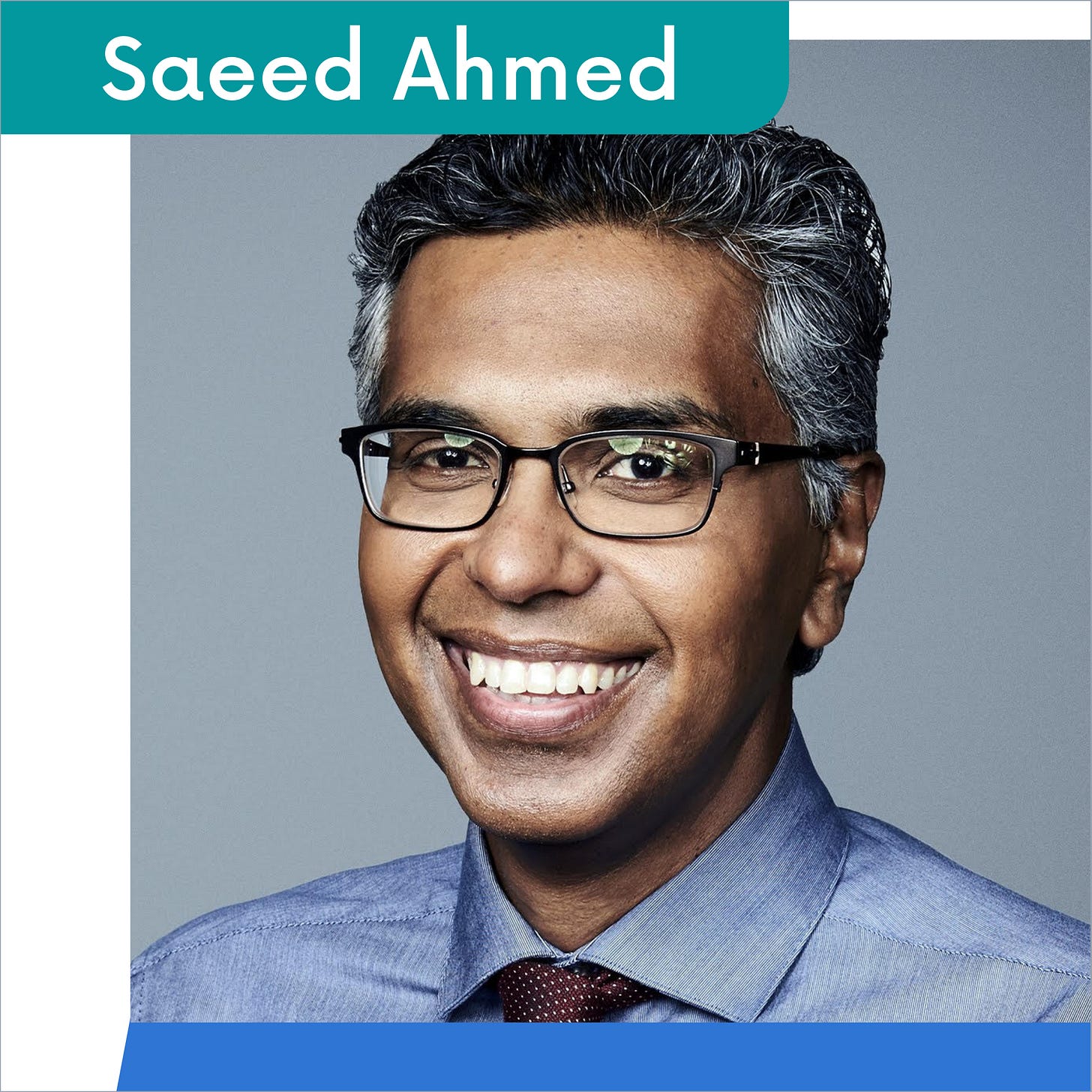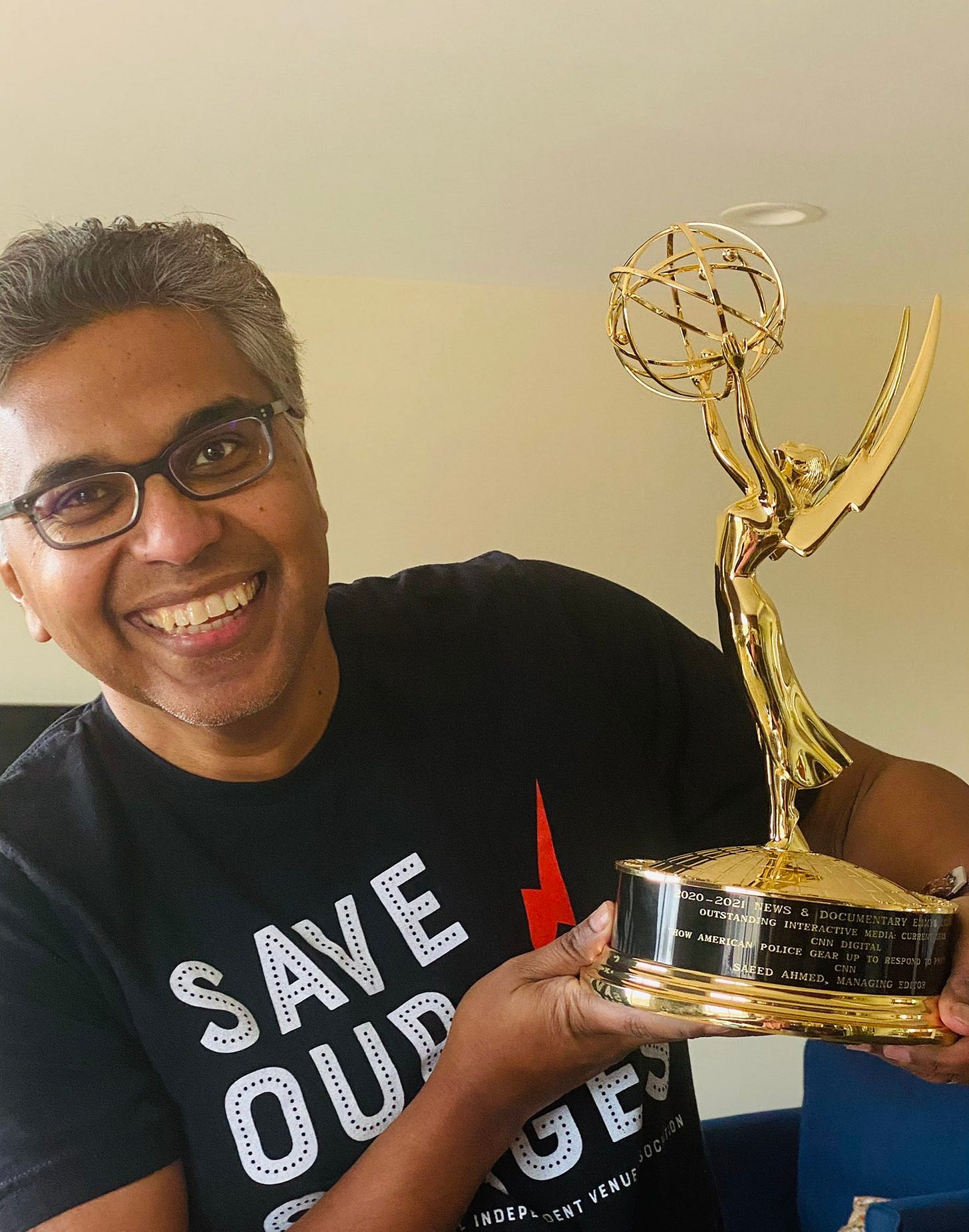Welcome! I’m Simi Shah, and every other week, I dive deep into the journey of a South Asian trailblazer. If you enjoy this issue, subscribe and write us a review.
Hot of the Pod🎙️ Saeed Ahmed, Director of Digital News @ NPR
In this episode, I welcome Saeed Ahmed, Director of Digital News at NPR.
Prior to joining NPR in 2021, Saeed served as Assistant Managing Editor of CNN Digital. He began his 13-year career at CNN as a Newsdesk editor for The CNN Wire, and went on to create the top two newsletters in CNN's portfolio: 5 Things and The Good Stuff. Previously, Saeed spent seven years at the Atlanta-Journal Constitution, where he was a part of the breaking-news team that became a Pulitzer Prize finalist. Recently, he was awarded a News Emmy Award for an interactive media piece, How American Police Gear up to Respond to Protests.
Originally born in Bangladesh and raised in the United Arab Emirates, Saeed first immigrated to the U.S. to attend Morehouse, a historical Black college. In this episode, Saeed takes us through his journey in journalism.
Excerpts from the pod below:
You interned at the Atlanta Journal Constitution one Summer, but they weren’t ready to hire you full-time. How did you make it happen anyway?
I was so adamant about landing a full-time job at the Atlanta Journal Constitution that I wrote for every section that Summer. I would write whatever they wanted me to write. But then come August, Julia Wallace, the editor in chief said, ‘Listen, you've been doing an amazing job, but we can't hire you straight out of college. Because whenever we do, the person has lost their fire because they feel like they've arrived. You need to start at a smaller paper and climb your way up.’ She said, ‘But we'll keep you on as a part timer until you learn something.’
Then, September 11 happened.
On 9/11, the AJC and many other newspapers were thoroughly unprepared. And here was me — a Muslim who had lived in the Middle East, who spoke a little bit of Arabic. I didn't really have connections to the community, but I could at least go in and out of Mosques. And I realized: this is my opportunity. I worked 73 hours straight and I did whatever was asked of me — there were some really crazy things. For example, on the day of the attack, they said, ‘We need someone to go and talk to people who work in tall buildings, and ask them how they feel.’ And so I would go there with a notepad and ask a security person, ‘Excuse me, how tall is this building? How many stories are there?’ And then the guy is like, ‘Who wants to know?’ Because I wasn't really a full-time reporter, so I didn't even have like a press pass or anything. So that was one crazy story…
The night before I was headed to Kentucky to interview for my first job, the AJC called and said, ‘We're hiring you.’ The next morning I received an email from Julia. She said, ‘You proved me wrong. Now prove me wrong again.’
It’s no secret: dating is hard. Everywhere you turn, there’s another episode of the Tinder Swindler or an aunty whispering, “You’re next.”
With their community of marriage-minded daters looking for an alternative to apps, Single to Shaadi is changing that. Built for South Asians in the U.S. and Canada, they offer matchmaking, dating profile consultations, and coaching services to help you find your true life partner.
Go from single to shaadi today — use [for subscribers only] for 15% off your intro package!
Obviously, as you advance through a career in journalism, you spend less time reporting, and more time focusing on the higher level mechanics of a newsroom. Did you ever struggle with that?
A reporter will always tell you that they never want to be an editor because you don't get a byline. Reporters live and die by bylines. They get to go to scenes. They get to talk to sources. It's a lot of fun, right? I grappled with it in the sense that when I became an editor, there were times when I would say, ‘I wish I could write this story.’ But that wasn't my job anymore. My job was to try to nurture and grow a group of people who could write that story. And it took a while to get over not seeing my own byline, but then it was replaced with: now I can really start making a difference. Because before, I could make a difference on my story level. I could write a story, and if I didn't write it, nobody would write it. But now I could really start molding a group of people and opening their eyes. When I came to NPR, it the same next natural step where instead of a team that I could mold and grow, it was seeing if I could do it across an entire department. It's always like that — the higher up you go, what motivates you and what you find fulfilling change. What I find most fulfilling right now, more than anything else, is placing journalists in newsrooms, and nurturing, cultivating, and growing them.
As someone who’s been at the vanguard of journalism for the better part of two decades, what are your thoughts on its evolution?
Look, people keep saying it: newspapers are dying. But news isn’t. Local news isn’t dying, it’s thriving. It's incredible what you said earlier — that the modes of information dissemination keep changing. We have to know what they are. And we need to — if not master it — be familiar with it.
Because the alternative is why newspapers died, right? They did not evolve. I teach a lot of these classes now about writing and how to be more digital. The other day, I was talking to this one newspaper and telling them about the value of conversational writing because that's how people read on the web, versus the stilted, stodgy AP, newspaper-y style. And the person said, ‘Most of our print subscribers are older, and if we take on the conversational model, we will lose them.’ I didn't say it out loud, but I'm thinking: you will eventually lose them anyway because they'll age out and…. die, right? So the question is are you afraid because you'll lose the audience you have? Or do you want to grow the audience? If you hold on to that the audience you have, you won't evolve, and that’s when you’ll face problems.
Full episode on Apple, Spotify, our website, or anywhere you stream podcasts. Until next time!








